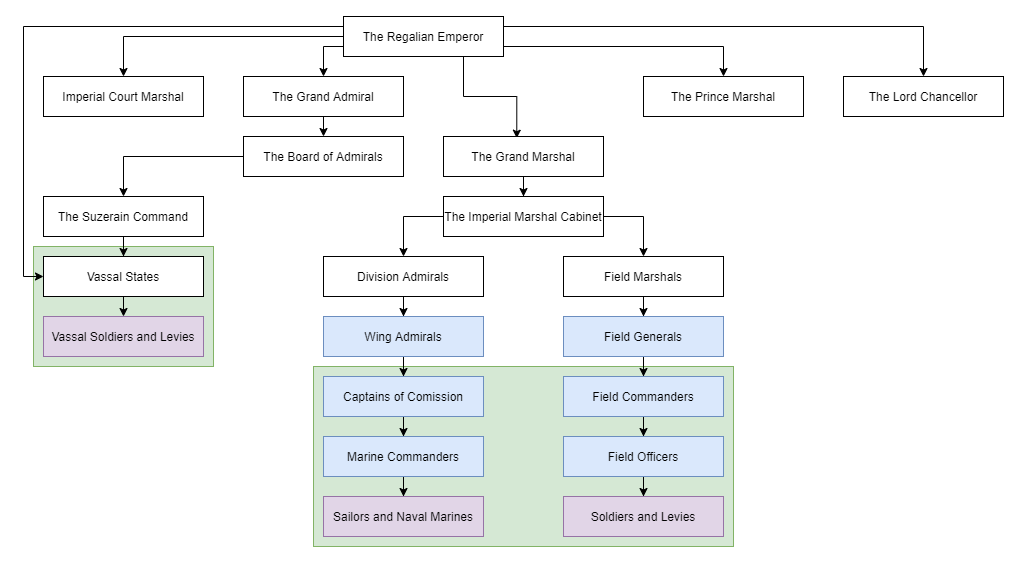More actions
| Regalian Military | |
|---|---|
 | |
| Organization | |
| Leader | The Regalian Emperor with various advisory boards |
| Headquarters | The Marshalry in Regalia |
The Regalian Military, comprising both the Imperial Navy and the Imperial Army, is the collective of the Regalian Armed Forces functioning directly under the authority of the Regalian high command. The Regalian Military is the sole military body responsible for the safety of the Regalian Empire, deploying troops during wartimes, and merchant fleet protection when violence is not rampant. The military itself extends the Emperor’s protection across the various suzerain states that are subject to the Regalian Commonwealth, and is also used as a means to intimidate or influence independent states. The Regalian Military is one of the largest military forces on Aloria which still retains a very structured organization, making it a formidable adversary to any state that finds itself on the opposite side of a military conflict.
History
The Regalian Military finds its rough origins in the Regalian Kingdom, though even this claim is debated by scholars. Before the Five Family Rebellion, the Kings of Regalia utilized the Breizh people of Kintyr as their main fighting force, though with the fall of the Ailor state and birth of the Regalian Empire came the tides of change. The first military organization founded in the wake of the Rebellion was the Viridian Order, though the vast majority of the infant Empire’s fighting power came from the feudal levies of the nobility. Still, this relatively loose structure was sufficient for the time, as the First Hecarian Conflict proved that the Empire could expand into the southwest of the Regalian Archipelago, toppling the Hecarian Kingdom in the process.
However, the Empire’s ascension into a military superpower would face its first hurdle during the first two decades of the Skagger Wars. While the Empire was able to capture territory from the Skagger Horde, their inability to hold onto these claims forced them to retreat to their established borders time after time. It would be Emperor Henri I that would solve this stagnation, and consequently define the next two centuries of Regalian history. Rather than focus on the ancient practice of fighting on land, Henri turned to the sea for the Empire’s destiny. After a brief war with the Bergerland Republic in 87 AC, the Empire gained newfound wealth from the mercantile state, and within a year the Imperial Navy was born. With the newfound ability to move armies over long distances in only days rather than weeks, the Empire exerted its power over neighboring states, before making the continental leap to Daen under the leadership of Chancellor Vlaas Kade.
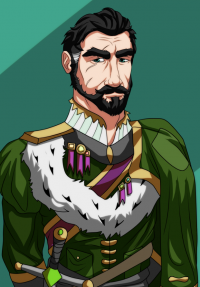
The next expansion to the Regalian Army came under the reign of Allamaria I, who was influenced by ex-Wirtemcaller generals and House Cadar to create a more formal hierarchy beyond the noble levies. Thus the Board of Admirals was established alongside the State Academy for Officers in 180 AC, with Hector Cadar appointed as the first Grand Admiral of the Marshalry that same year. Under the Cadar Marsharly, the Regalian Military’s leadership was drilled and conditioned into a standardized fighting force, able to fight wars effectively and efficiently across Aloria, setting up governorships for the Empire as nations were brought to heel.
The Regalian Military would remain roughly the same up until the rearmament period preceding the Chrysant War, which saw the pride of the Imperial Navy, the Anglian Naughtknight, first constructed in the Anglian Great Works. Following the war, Emperor Justinian II made the next great advancement to the Regalian Military by passing the Tenpenny Act of 192 AC. Taking note of the feudal levies’ poor performance against the armies of the Essa Empire, this Act created the first professionally trained soldiers, while also birthing the formal Imperial Army. Within the decade, the Regalian Military’s land-based performance soared, with Tenpennies slowly phasing out the levies, which were now used as auxiliary reinforcements.
In present times, the Regalian Military has undergone its most recent structural change under former Emperor Cedromar I. Believing the Board of Admirals to be too ineffective in carrying the multiple duties required for a Soldier Emperor’s campaigns, he created the Imperial Marshal Cabinet, a body of Admirals and Generals that would handle the movements of the Regalian Military, while the Board of Admirals handles logistical matters and standardizations.
Command and Organization
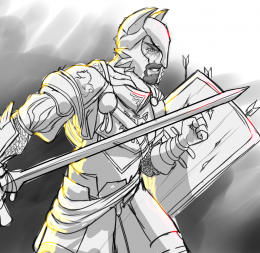
The Regalian Military consists of both the Imperial Navy and the Imperial Army, though both fall in under the same overarching hierarchy which stems from the Emperor himself. At the top are the various core leadership positions and bodies, which trickle down to the various commanders and officers, before ending with the run of the mill soldiers conscripted into service. Despite the hundreds of thousands of men and women that fall under the Regalian Army, the chain of command ensures that each soldier knows who they answer to in order to carry out their orders effectively.
Below is a hierarchy listing the complete Regalian Armed Forces. Positions that include no special privileges are marked in Purple, while those that do are marked in Blue. Note that playing a member of the Regalian Military in any capacity requires an approved Character Application.
Note: Various white marked positions are Core Leadership Positions not available for players through Character Applications. These can only be granted based on Noble DM decision, or via the Military System.
Core Leadership Military Positions
- The Regalian Emperor - The Emperor acts as the overarching authority over the military and holds the final say on all military matters. However, most decision making is directed to other bodies or individuals, making the Emperor’s position mainly a formality.
- The Lord Chancellor - The Chancellor is not part of the military hierarchy, though is included here due to his ability to declare war on foreign states, and indirectly directing where the Regalian Military should focus its efforts.
- The Prince Marshal - The Prince Marshal is an honorary position given to an Imperial Prince who serves in the Regalian Military. The current and only Prince Marshal is Cedromar Kade, who previously held the position before his ascension to the Imperial Throne.
- The Imperial Court Marshal - The Imperial Court Marshal is another honorary position which indicates the Emperor’s favorite General or Admiral, and also serves as the Master of Medals at award ceremonies. The current Imperial Court Marshal is Lord William Howlester, who is one of the most decorated generals in recent history.
- The Grand Admiral - The Grand Admiral is the highest decorated commander in the Regalian Military, and heads the Board of Admirals. The current Grand Admiral is Duke Karl II von Treppewitz, who has held the position since the end of the Chrysant War.
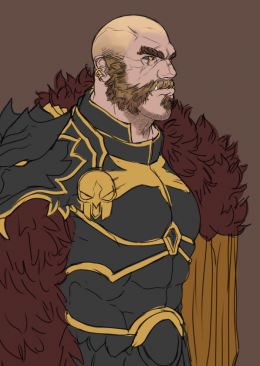
- The Board of Admirals - The Board of Admirals is the overarching authority in regards to the organization of the Regalian Military. They oversee the various military academies under the Marshalry, determine the lastest doctrine for troops to follow, and act as the interfacing body between the Regalian Military and the Suzerain Command.
- The Suzerain Command - The Suzerain Command is the official communication line between the Regalian Archipelago and the Vassal States. They are responsible for delivering the Military’s reinforcement orders to the various sovereigns, who in turn negotiate with the Military in regards to their usage and placement.
- The Grand Marshal - The Grand Marshal is the overseer of the Imperial Marshal Cabinet and can veto any decision made by the Cabinet. This position is currently vacant, but can be appointed (and removed) by a majority vote of the Cabinet.
- The Imperial Marshal Cabinet - The Imperial Marshal Cabinet is the body in charge of forming and executing military plans for the Regalian Military. They are also in charge of updating and keeping the Military Laws. To be on the Imperial Marshal Cabinet, one must apply via the Military System.
- Division Admirals - Division Admirals are Admirals that control a so-called Division Armada, which encompasses several Wing Fleets in a specific theatre. This position can only be granted by promotion through the Military System.
- Field Marshals - Field Marshals are Military Commanders that oversee an Army Group, which encompasses several Field Armies in a specific theatre. This position can only be granted by promotion through the Military System.
Privileged Military Positions
- Wing Admirals - Wing Admirals are Admirals that control Wing Fleets, which are collections under ten ships which are on specific missions. This position can be written into a character’s backstory.
- Captains of Commission - Captains of Commission are the captains of individual ships which make up the Wing Fleets. If serving on an Admiral’s flagship, they are given the rank of Cadet-Captain, which is a slightly more prestigious rank than a regular Captain of Commission. This position can be written into a character’s backstory.
- Maritime Commanders - Maritime Commanders often accompany Captains of Commission as the commanders of the Naval Marines, a set of professional sailors on battleships during naval combat situations or amphibious assaults. This position can be written into a character’s backstory.
- Field Generals - Field Generals are army commanders that oversee a Field Army, which is a collection of 20,000+ soldiers on a battlefield. This position can be written into a character’s backstory.
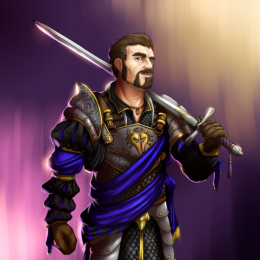
- Field Commanders - Field Commanders are the army commanders that control a Regiment, or a collection of 200-300 soldiers serving under a Field General. This position can be written into a character’s backstory.
- Field Officers - Field Officers are the army commanders that lead a Squad, or a group of 10-20 soldiers on a battlefield. This position can be written into a character’s backstory.
Privilege-Free Military Positions
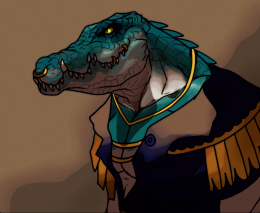
- Vassal Soldiers and Levies - Vassal Soldiers and Levies are the various troops supplied by suzerain states such as the Kingdom of Nordskag or the Ithanian Sovereignty. These troops are considered primary citizens of their home nation, which separates them from the Regalian soldiers and Levies
- Sailors and Naval Marines - Sailors and Naval Marines are the men who power the Imperial Navy. Sailors are the typical crew that are in charge of sailing the ship and keeping it seaworthy. Naval Marines are the professional soldiers that specialize in ship-to-ship combat underneath various Marine Commanders.
- Soldiers and Levies - Soldiers and Levies comprise the professional Tenpenny Armies or Levies which are summoned from the peasantry by their feudal overlords. Along with Sailors and Naval Marines, the majority of the Regalian Military’s forces fall under this category.
Warship Classes
The Imperial Navy has access to several different model Regalian warships, state of the art weaponry developed by Regalians, as well as Qadir and Dwarves in service to the Regalian Navy. Over the years, technological innovations have obsoleted older class ships, but general designs have been maintained over the centuries, in the belief that raw firepower will win the day. A list is presented below, highlighting the main warship classes as well as basic information on each warship design.
- Girobaldin Fregat - The Girobaldin Fregat is often used as a reconnaissance vessel, sporting only 16 cannons, but in turn, remaining considerably lighter than all other ships, and thus faster. The Girobaldin shipyards favor smaller, faster ships over the heavier battleships of the north, and as such, most scout vessels are made in Girobalda. In order to captain a Fregat, one would need to have a third rate naval commendation.
- Anglian Frigate - Anglian Frigates make up the bulk of the Regalian Navy. These so-called light frigates tend to carry around 40 cannons. Despite being called the Anglian Frigate, most of these frigates are produced in Dragenthal, as Anglia lacks moderate shipyards. In order to captain a Frigate, one would need to have a second-rate naval commendation.
- Calemberg Third Line - Calemberg Third Lines are the first responder battleships which favor cunning, offensive, and blitz tactics. The ship is relatively light, but manages to sport 52 cannons. What’s curious about Calemberg Third Line ships is that their wooden parts always look very dark, even in absence of paint, due to the tree material with which these ships are made. In order to captain a Third Line, one would need to have a first-rate naval commendation.
- Calemberg Second Line - Calemberg Second Lines are the main coastal offense ships that favor troop transport, as well as long range fire capabilities. These ships hardly ever engage in naval combat as they are primarily used for coastal bombardments and naval assault support. Despite being heavier in tonnage than the Third Line, Second Line ships only sport 22 cannons, though of a very heavy caliber. In order to captain a Second Line, one would need to have an offensive naval commendation.
- Anglian Nautknight - Anglian Nautknights are the true beasts of the Regalian Navy, providing a terrifying amount of firepower, as it boasts somewhere around 162 cannons, a mixture of heavy and light cannons. Anglian Nautknights are rarely ever deployed unless the Regalian Navy is required to defend a key position since these ships are so large and heavy that they are impractical for chasing enemies down. Nautknights are few in number and rarely produced in the Anglian Great Works, the only drydock large enough to allow construction of Nautknights. In order to captain a Nautknight, one would need to have an Imperial High Command commission.
OOC Notes
- It is heavily encouraged to make your military character attend the School of Marshalry if they hold a position in the Regalian Military. While recent years have seen foreign commanders enter the military structure, the vast majority of the Marshalry (including the soldiers at the very bottom) believes that anything other than a Regalian tactical education is subpar and lacking competency.
- Characters that have a job in the military are usually part of the military for life unless something happens in roleplay that denies them this position. You shouldn’t make a character with the express purpose of immediately changing their job when it starts becoming an active duty in roleplay.
- Being a military man doesn’t grant any additional rights in roleplay. Off-duty soldiers (which is essentially every soldier in Regalia), do not get any special weapon rights or criminal leniency. All soldiers who are roleplaying in Regalia are always off-duty and will only participate in battles when war is actually ongoing.
- Even if your character has held a specific rank via their educational backstory, you are not allowed to claim a rank in roleplay without the approval of the Imperial Marshal Cabinet. Generals and Admirals may receive a commission via the Imperial Marshal Cabinet, while positions below these ranks (found in the large green box) can receive commendations (which are essentially commissions for lower-level officers) by being in the retinue of a commissioned General or Admiral.
Trivia
- Most Sailors in the Imperial Navy are actually criminals who are pressed into service in exchange for more lenient sentencing. Due to the strict discipline and long deployment times, most criminals fall strictly in line since the Navy has the right to execute deserters on the spot.
- Various commanders often compete with one another over Imperial glory. Not all military men see eye to eye, as many try to outdo each other and seize military commissions. It is likely that for example Tenpenny soldiers are loyal to one another, but have an ongoing turf war with Naval Marines.
- There are several names given to areas of the Regalian Military. The Imperial Navy is sometimes referred to as the Crown Fleets or Regalian Armadas, while the Imperial Army is often known as the Tenpenny Armies (due to the professional soldiers of the main forces) or Mark Armies.
- There are several schools and organizations that provide auxiliary troops for the Regalian Military, such as the School of Drixon, School of Rangers, and the School of Wapnbog.
| ||||||||||||||||||||||
| Accreditation | |||||||
|---|---|---|---|---|---|---|---|
|
| ||||||
